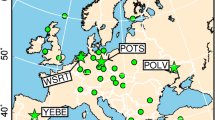Abstract
Reliable HF communications require propagation assessment. Such assessment could be facilitated with the monitoring of ionospheric characteristics by continuously available passive means, i.e., measurements of the total electron content (TEC) using satellite-emitted signals without a need for burdening the electromagnetic spectrum. With the Global Positioning System (GPS) providing instantaneous time delay, or equivalently, TEC, values when needed, an assessment of HF propagation may be available on a near realtime basis.
To assess this possibility a one year study of the correlation between TEC and f 0F2 using GPS time delay observations taken at Matera, Italy and f 0F2 measurements from Rome, Italy, was undertaken during 1995–1996. This is a period of minimum solar activity with sunspot numbers varying between 6–18. The observed correlation coefficient varied between 0.55 in the winter of 1996 to about 0.75–0.8 during the summer of 1995.
In addition to the seasonal variability of the correlation coefficient, a diurnal variability is also present with the coefficient normally maximizing during the day and minimizing in the predawn periods. The predawn minimum may be due to the contribution of plasmaspheric electron content. The correlation coefficient appears to increase with magnetic activity, indicating that TEC and f 0F2 behave similarly during magnetically active periods. Distribution of errors between measured f 0F2 values and predicted ones using a) standard predictions algorithms and b) TEC measurements converted to f 0F2 from a model of slab thickness, show that the errors are reduced when using TEC observations. The errors would be further reduced if the satellite subionospheric point would approach the location of the f 0F2 actual measurement.
Similar content being viewed by others
References
Fox M W, Mendillo M, Kiobuchar J A 1991: Radio Sci., 26, 429–438.
Houminer Z, Soicher H 1996: Radio Sci., 31, 1099–1108.
Kiobuchar J A 1987: Ionospheric time-delay algorithm for single frequency GPS users. IEEE Trans. Aerosp. Electron. Syst., AES-23, 325–331.
Kiobuchar J A, Doherty P H, Bailey G J, Davies K 1994: In: Proceedings International Beacon Satellite Symposium, L Kersiey ed., Univ. of Wales, Aberystwyth, 1–4.
Mendillo M, Papagianis M D, Kiobuchar J A 1972: J. Geoph. Res., 77, 4891.
Soicher H, Gorman F J, Tsedilna E F, Weitsman O V 1995: Radio Sci., 30, 755–764.
Wilson B D, Mannucci A J 1993: Instrumental biases in ionospheric measurements derived from GPS data. Paper presented at ION GPS-93, Inst. of Navig., Salt Lake City, Utah
Author information
Authors and Affiliations
Rights and permissions
About this article
Cite this article
Soicher, H., Houminer, Z. Determination of f 0F2 Short-Term Variations from GPS Time Delay Observations. Acta Geod. Geoph. Hung 33, 111–119 (1998). https://doi.org/10.1007/BF03325528
Published:
Issue Date:
DOI: https://doi.org/10.1007/BF03325528




